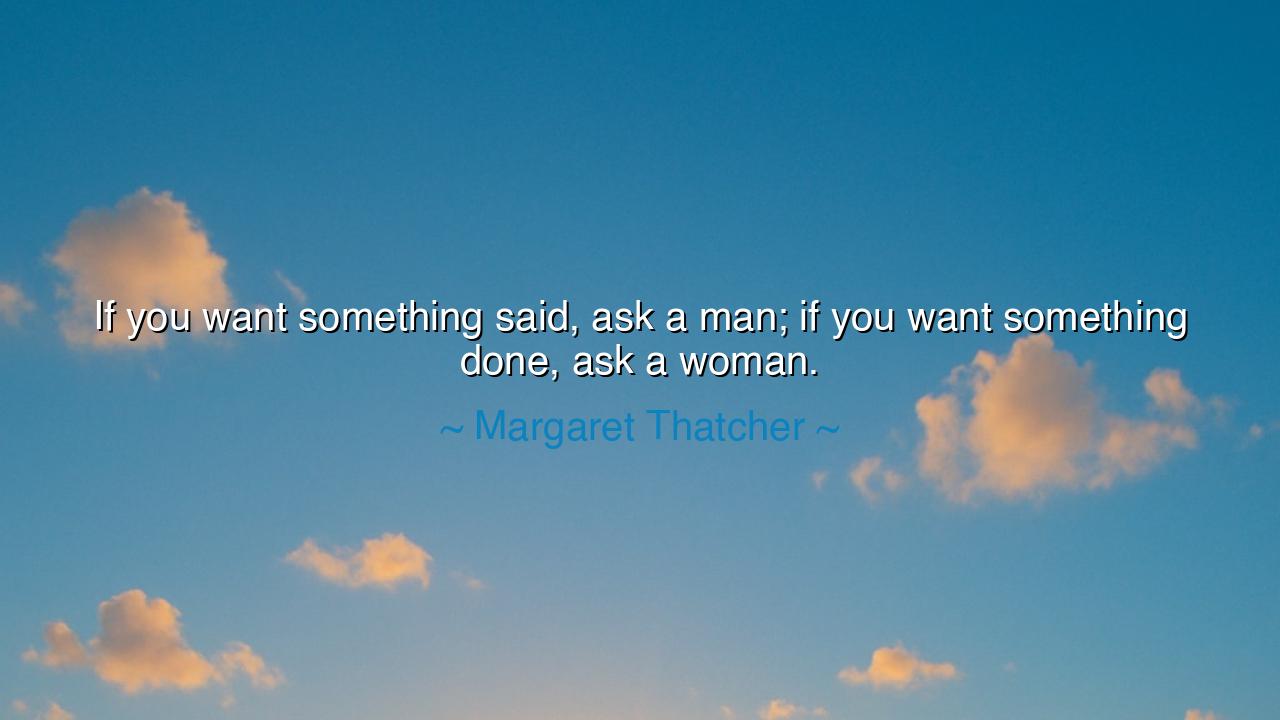
If you want something said, ask a man; if you want something






Hear the sharp and commanding words of Margaret Thatcher, the “Iron Lady,” who declared: “If you want something said, ask a man; if you want something done, ask a woman.” In this sentence, she distilled both wit and truth, unveiling an observation forged from her years in politics and life. She spoke of the gap between words and deeds, between promises and accomplishments, and she lifted up the enduring strength of women who, often unseen, have carried burdens, solved problems, and made things happen when others merely talked.
The origin of this quote arises from Thatcher’s experience in the arena of government and leadership, where speeches abound, but decisive action is rare. She had witnessed the endless cycles of debate and rhetoric, yet she knew that real progress comes from those who roll up their sleeves and work tirelessly, often without glory. Her words are a recognition of the practical effectiveness of women, who throughout history have balanced households, raised children, managed communities, and endured trials with unyielding determination, while others were content to speak of ideals without acting upon them.
History itself gives powerful examples. Consider Florence Nightingale, who did not stand in halls to make speeches about the suffering of soldiers. Instead, she went to the battlefields of Crimea, bringing order to chaos, cleanliness to filth, and healing to the wounded. Her tireless work transformed modern medicine and nursing. She was one of those women Thatcher spoke of: not merely saying what must be done, but doing it with her own hands, changing the course of history through action.
The meaning of Thatcher’s words is also a reflection of the unseen labor of women across generations. While men were often granted platforms to speak, women were confined to duties thought “lesser.” Yet within these duties, women proved themselves the true builders of families, communities, and nations. They acted where others hesitated, they endured where others faltered, and in their quiet strength they carried the world forward. Thatcher herself, as Britain’s first female Prime Minister, embodied this principle: she did not seek merely to speak of power, but to wield it with clarity and force.
Yet her saying also cuts with irony, for it challenges the vanity of empty words. To say something is easy; to do something is costly. To speak requires little sacrifice; to act often demands everything. In lifting up women as the ones who “get things done,” Thatcher was not only praising them but calling all to recognize that true strength lies in action, not rhetoric. She was urging her listeners to value deeds over speeches, substance over sound.
The lesson for us is clear: let your worth be measured not by what you say, but by what you do. Speak if you must, but let your speech be matched by action. Do not be one who promises much and delivers little. Instead, let your life be like those women Thatcher honored—defined by follow-through, by resilience, by the courage to finish what others only dream aloud.
Practically, this means cultivating a discipline of action in our own lives. Do not wait for perfect conditions before you begin. Do not rely on words to shape your reputation; let your deeds speak for you. In your work, in your family, in your community, be the one who moves forward, who acts, who makes things real. Carry out what you promise, and you will be remembered not for your speeches, but for your legacy.
So let us carry the wisdom of Margaret Thatcher: “If you want something done, ask a woman.” Let it remind us that words alone do not change the world; actions do. And let it inspire all—women and men alike—to live as those who move beyond rhetoric, into the realm of deeds that endure, deeds that transform, deeds that carve greatness upon the pages of history.






TPThao Phuong
I find this statement thought-provoking but potentially contentious. It makes me consider whether the perception of women as more action-oriented stems from necessity—having to prove themselves—or from innate characteristics. How might modern workplaces interpret this idea, and could it influence expectations or pressure on women to always deliver results? It prompts a discussion about balancing recognition of women’s effectiveness with avoiding gendered stereotypes that limit everyone.
TVNguyen Thanh Viet
This quote is compelling because it celebrates action and results, yet I question whether it creates unnecessary division between genders. Is the emphasis on women’s capability meant to challenge traditional male-dominated power structures, or does it risk reinforcing a binary view of competence? It raises broader questions about how success, efficiency, and leadership are evaluated across different genders and whether these traits are culturally learned rather than inherent.
Vvutoanthang
Reading this, I feel intrigued but skeptical. Could Thatcher’s statement unintentionally oversimplify complex human behaviors by attributing effectiveness to women and mere talk to men? I wonder whether this reflects her own perspective shaped by her position as a woman in politics. It also prompts reflection on how societal biases influence assumptions about capability, efficiency, and responsibility in both men and women.
HDDoan Hai Dang
This statement is bold and provocative, but it raises questions about generalizations. Is Thatcher highlighting a difference in action-oriented versus talk-oriented tendencies between genders, or is it more of a reflection of her personal experiences? How might this statement be perceived today in terms of promoting equality versus reinforcing stereotypes? It sparks a discussion on whether leadership, initiative, and follow-through are inherently linked to gender or shaped by social and cultural expectations.